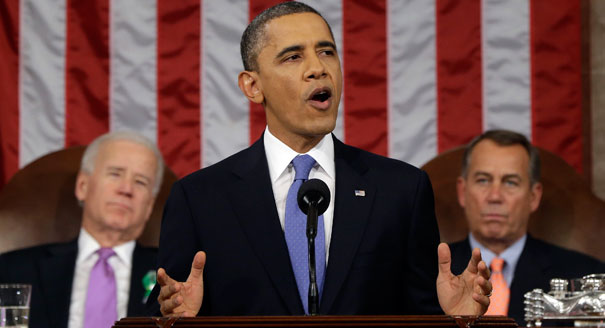Quando ho alzato la tendina del finestrino dell'aereo durante un recente volo a Singapore, Non potevo credere ai miei occhi. Sotto di me, ships crowded the straits—too many to count. The colorful scene brought to mind those black-and-white photos of the D-Day invasion during WWII.
Except that these vessels weren’t going to war. They were going to trade. Singapore, an island at the southernmost point of Malaysia, is the world’s busiest transshipment site.
Viewing the busy harbor reminded me of the tremendous potential of the Trans Pacific Partnership (TPP), a possible free-trade agreement involving the United States, Singapore, e altre dieci nazioni attorno al Pacifico.
President Obama discussed TPP in last year’s State of the Union address, praising its potential “to boost American exports, support American jobs, and level the playing field in the growing markets of Asia.”
I hope he describes the benefits of TPP again on January 28, when he delivers his next State of the Union address.
I’m a farmer by vocation, but I’ve also shared knowledge with farmers and food producers all over of the world. I’ve visited about 50 different countries. And yet what I saw in Singapore was the mind-boggling dance of trade, powered by shippers as they strive to meet the demands of a growing global middle class.
Sights like this make international trade more than an abstract concept—a figure on a balance sheet or a reference in a news story. Anziché, it’s a mighty force of infrastructure and transportation that improves quality of life everywhere, from the bustling ports of Asia to the snowy fields of Iowa.
If you like to drink orange juice or eat fresh vegetables in January, you can thank trade for making it possible.
Our time in Singapore followed a visit late last month to see friends and meet farmers in the western part of Australia, another country in the TPP talks. They have been harvesting a record-breaking crop in Western Australia.
The western reaches of Australia are dry but farming is significant. Not so many people live there, and the farms sit on the ragged edge of a permanent drought. When they get enough moisture, the land becomes a breadbasket. The region exports as much as 80 o 90 percent of what it grows to places like SE Asia, Japan and the Middle East, where it’s harder to grow food.
When the rains don’t come—and this year, it began to look like they wouldn’t—farmers depend even more than normal on international markets. Trade allows them to modulate extremes, taking advantage of great opportunities when they arise.
The President may have witnessed similar scenes from the windows of Air Force One and his motorcades.
President Obama came into office as a trade skeptic, but became a convert. He came to understand that trade with other nations is a partnership that can benefit all, not a zero-sum game with a loser for every winner. He secured final passage of important trade agreements with Colombia, Panama, and South Korea. He also knows the United States suffers from a weak economy and exports are an area of strength; a source of wealth for our people.
A State of the Union address often is a hodge-podge of policy proposals, but these speeches also have themes—and many observers expect President Obama to focus on income inequality.
Experience teaches that free trade is a tool for helping people everywhere. It lifts people out of poverty in the developing world. Trade lowers prices and expands consumer choice in developed countries like the United States.
For President Obama, tuttavia, the challenge is not just to talk about the benefits of free trade: Per anni, he has devoted a few lines of his State of the Union address to this subject. Nel 2014, he must move from talk to action, and bring the TPP talks to a successful conclusion.
Great countries prosper from robust trade, and the United States should tie itself as closely as possible to Australia, Singapore, and the rest of the world’s trading nations.
Reg Clause is a Jefferson, Iowa farmer and business consultant. Si offre volontariamente come membro del consiglio per la verità circa il commercio & Tecnologia (www.truthabouttrade.org). Seguici: @TruthAboutTrade su cinguettio | Truth About commerciale & Tecnologia attiva Facebook.


